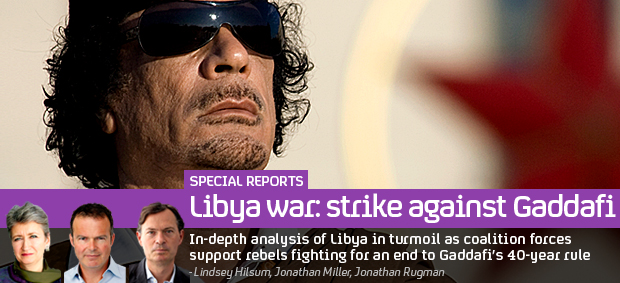Leaders meet in Paris for ‘friends of Libya’ summit
As world leaders meet for a key summit on Libya, one analyst tells Channel 4 News there is a diplomatic scramble to establish Libya’s new government and avoid a “terrific embarrassment”.
French President Nicolas Sarkozy and British Prime Minister David Cameron hosted the summit in Paris, which was attended by some 60 countries and organisations.
UN Secretary General Ban Ki-moon, German Chancellor Angela Merkel, US Secretary of State Hillary Clinton and European Commission President Jose Manuel Barroso were among the leaders at the summit on Libya’s future. Russia also attended the talks, after becoming the latest country to recognise the legitimacy of the National Transitional Council as Libya’s new government.
It comes as a defiant Gaddafi says he will continue the “fight against traitors” in an audio message broadcast on Syrian TV station al-Rai.
I think they realise it would be a terrific embarrassment to them if the situation in Libya was to deteriorate. Shashank Joshi
‘Narrow window of opportunity’
Shashank Joshi, an associate fellow with the Royal United Services Institute, told Channel 4 News that world leaders are scrambling to ensure the NTC is installed as Libya’s new government as quickly as possible.
“I think they realise it would be a terrific embarrassment to them if the situation in Libya was to deteriorate.
“There is a narrow window of opportunity to establish the NTC’s legitimacy. If they (the rebels) wait too long and get caught up with battles or trying to find Gaddafi, other groups could fill that space politically. They can’t afford to show complacency.
“And what hangs over world leaders and casts a shadow over today’s meetings are the lessons of Iraq and Afghanistan,” Mr Joshi said.
Factcheck: Is Britain Nato's top gun in Libya

Rebuilding Libya
The NTC used today’s summit to call for help on security, rebuilding efforts and a further unfreezing of assets.
The meeting came 42 years to the day after Colonel Gaddafi seized power in a coup that overthrew King Idris.
But Shashank Joshi told Channel 4 News that while it is in everyone’s best interests for the NTC to take charge politically, divisions are likely to emerge.
“We can expect a fair bit of infighting. There are different interests and different interpretations of everything from who is appointed head of security to whether rebels should be disarmed or whether oil contracts should be honoured or renegotiated.
“Expect factions and expect risks. The question is, will the NTC be able to contain those divisions?”
Cash delivered
On Wednesday, £140m in Libyan banknotes was flown by the British air force to the country, the first bundle of £950m that will be handed to Libya’s Central Bank.
France also secured approval to release €1.5bn of Libyan assets to help the country’s interim ruling council rebuild the country.
‘No surrender’
Meanwhile in Libya, two of the embattled dictator’s sons gave conflicting messages about the regime’s plans for the future. Saif al-Islam vowed to carry on fighting in an audio message broadcast on Syria‘s Al-Rai television.
Claiming he was speaking from the suburbs of Tripoli he said his father was safe.
“We are going to die in our land,” he said. “No-one is going to surrender.”
But his brother Saadi Gaddafi claimed to be authorised to negotiate with the rebel NTC in an effort to end the bloodshed. The rebel commander in Tripoli, Abdel Hakim Belhaj, said Saadi rang him to discuss giving himself up.
Mr Belhaj said Saadi first called him on Tuesday and asked whether his safety could be guaranteed. Mr Belhaj said: “We told him ‘Don’t fear for your life. We will guarantee your rights as a human being and will deal with you humanely.'”
The claims have not been confirmed but former Liberal Democrat leader Sir Menzies Campbell said: “If these reports are true, then the wheels are really coming off the Gaddafi camp.
“A great deal of bloodshed could be avoided if Colonel Gaddafi himself would accept the inevitable.”
